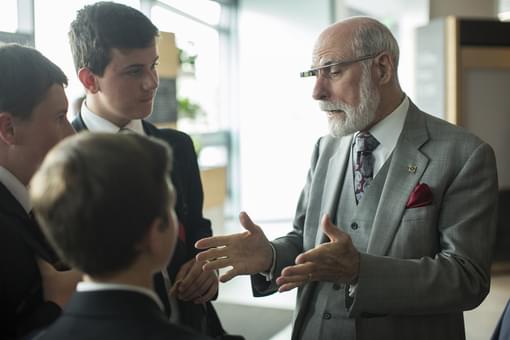Dr Vint Cerf – 5 years on from winning the QEPrize
Categories: QEPrize Technology

Dr Vinton Cerf was one of the recipients of the inaugural QEPrize, taking the accolade in 2013 for his part in creating the Internet. He was awarded the prize alongside Dr Robert Kahn, Louis Pouzin, Sir Tim Berners-Lee and Marc Andreessen, whose work gave rise to the fundamental architecture of the internet, the World Wide Web and the browser. We caught up with Cerf, who is now vice president and Chief Internet Evangelist for Google, to find out what his team has been working on since he received the prize.
What did it mean to be honoured with the inaugural Queen Elizabeth Prize for Engineering?
I considered this to be a huge honor given by the world’s most visible monarch, and particularly meaningful because it was for engineering as opposed to science.
What effect has winning the QEPrize had on you and the team at Google?
It reinforced our belief at Google that engineering and applied research are vital means by which the world is made a better place for its inhabitants.
What have you been working on since winning the QEPrize?
I have been focused on the preservation of digital information (a very big problem) and the safety and security of devices in the “Internet of Things” category.
Last year’s award went to the engineers who brought us digital imaging sensors and changed the way we see the world. How have digital image sensors played a part in your own work and personal life?
Digital imaging has been made a part of everyone’s life who has a smartphone/camera. It has enabled research in all fields from biology to astronomy and beyond. It has allowed us to peer into our bodies in non-invasive ways. It has facilitated self-driving vehicles. It has made books and other documents globally accessible that would otherwise have been invisible.
Advances in the world of engineering are happening ever-faster. What innovations would you like to see that go on to change the world and win the QEPrize in the future?
I hope we see some really serious engineering for artificial intelligence and machine learning which I believe will become tools to augment our own capabilities. A partnership with such capabilities will accelerate our knowledge of the world and how it works.
How do you think awards such as the QEPrize can help to inspire younger generations?
Young people need to know that scientists and engineers who have done great things did it while they were relatively young – that will surely inspire youth to aim high. We need to remind them that some of the best work has been done while under 35 years of age!



